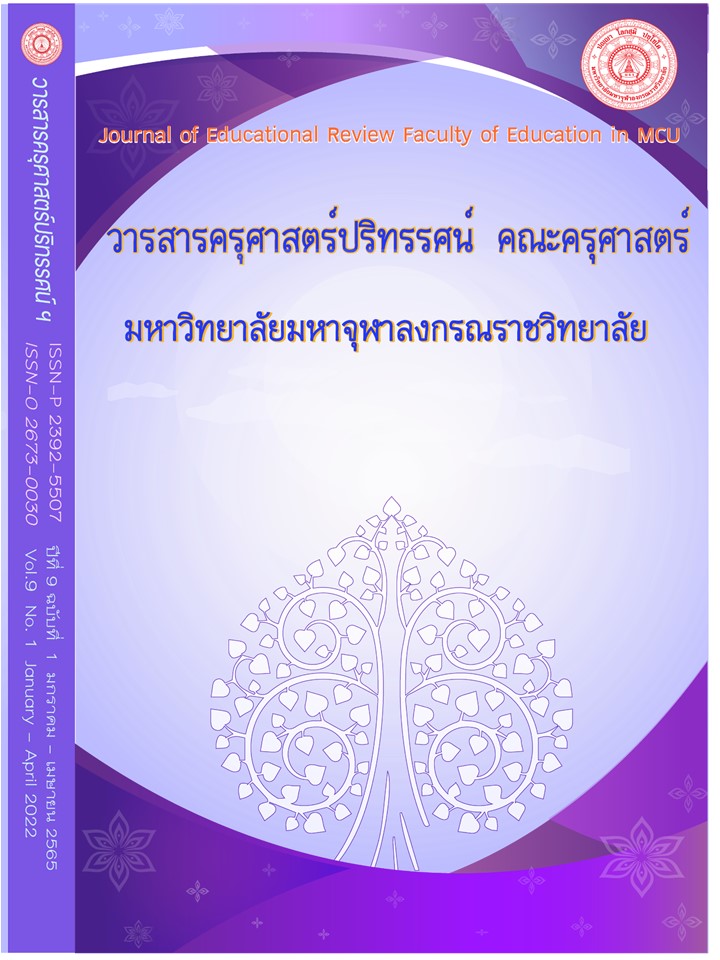A DEVELOPMENT OF MULTICULTURAL EDUCATION MANAGEMENT MODEL FOR PRIMARY SCHOOLS UNDER SAMUTPRAKAN PRIMARY EDUCATIONAL SERVICE AREA OFFICE
Main Article Content
Abstract
This research is aimed at 1) To study the state and expectation of multicultural education management for primary schools. Samples for this stage comprised 216 administrators and academic teachers of primary schools. Using questionnairs to collect information. Data were analysed using mean average and standard deviation. 2) To develop of multicultural education management model for primary schools under Samutprakan Primary Educational Service Area Office. Samples for this stage comprised 9 experts. Using In-Depth Interview to collect information. Data were analysed using standard deviation and interquartile range. 3) To evaluate of multicultural education management model for primary schools under Samutprakan Primary Educational Service Area Office. Samples for this stage same stage 1. Using questionnaires to collect information. Data were analysed using mean average and standard deviation. The research found that 1) State of multicultural education management for primary schools under Samutprakan Primary Educational Service Area Office found in high level and expectation of multicultural education management in highest level. 2) A multicultural education management model for primary schools under Samutprakan Primary Educational Service Area Office composes of 5 components. Each component were participation, multicultural education, positive thinking, social equality and creative culture. There were overall 140 activities. 3) The developed of multicultural education management model for primary schools under Samutprakan Primary Educational Service Area Office were evaluated found thatappropriate, useful at a highest level and possible to use at a high level.
Article Details

This work is licensed under a Creative Commons Attribution-NonCommercial-NoDerivatives 4.0 International License.
ทัศนะและความคิดเห็นที่ปรากฏในบทความในวารสารฉบับนี้ถือเป็นความรับผิดชอบของผู้เขียนบทความนั้นเพียงผู้เดียว และไม่ถือเป็นทัศนะและความรับผิดชอบของกองบรรณาธิการ
กองบรรณาธิการขอสงวนสิทธิ์ในการคัดเลือกบทความลงตีพิมพ์และจะแจ้งให้เจ้าของบทความทราบหลังจากผู้ประเมินบทความตรวจอ่านบทความแล้ว
ต้นฉบับที่ได้รับการตีพิมพ์ในวารสารครุศาสตร์ปริทรรศน์ คณะครุศาสตร์ มหาวิทยาลัยมหาจุฬาลงกรณราชวิทยาลัย ถือเป็นกรรมสิทธิ์ของคณะครุศาสตร์ มหาวิทยาลัยมหาจุฬาลงกรณราชวิทยาลัย ห้ามนำข้อความทั้งหมดหรือบางส่วนไปพิมพ์ซ้ำ เว้นเสียแต่ว่าจะได้รับอนุญาตจากมหาวิทยาลัยฯ เป็นลายลักษณ์อักษร
References
จรูญ จัวนาน. (2538). การศึกษาสำหรับสังคมหลายวัฒนธรรม. วารสารรูสะมิแล. 16. 22-26.
บังอร ร้อยกรอง. (2553). การพัฒนาแนวทางการจัดการศึกษาในสังคมพหุวัฒนธรรม. ดุษฎีนิพนธ์คุรุศาสตรดุษฎีบัณฑิต. วิทยาลัยจุฬาลงกรณ์มหาวิทยาลัย.
สุชาติ ถาวระ, เสาวณีย์ สิกขาบัณฑิต และพีระพงษ์ สิทธิอมร. (2562). กลยุทธ์การจัดการศึกษานอกระบบของศูนย์วิทยาศาตร์ เพื่อการศึกษานราธิวาสเพื่อความมั่นคงของจังหวัดชายแดนภาคใต้. วารสารวิชาการ มหาวิทยาลัยนอร์ทกรุงเทพ. 8(1). 196-203.
อธิปัตย์ คลี่สุนทร. (2552). การศึกษาพหุวัฒนธรรม. แหล่งที่มา www.moe.go.th/moe/th/news/detail.php?NewsID=30582&Key=news_research สืบค้นเมื่อ 8 ก.ค. 2552.
อามัดไญนี ดาโอะ. (2551). การสอนพหุวัฒนธรรมในสามจังหวัดชานแดนภาคใต้...จำเป็นจริงหรือ?. แหล่งที่มา http://www.saengtham.com/collum5.pdf. สืบค้นเมื่อ 1 ก.พ. 2554.
Banks, James A. (1994). An Introduction to Multicultural Education. Boston: University of Washington, Seattle.
Bordas, J. (2009). White Men and Women Can’t Lead (everyone): Eight Ways to Practice Multicultural Age. Public Management. 91(1). 3-6.
Canen, A. G. & Canen, A. (2002). Multicultural Leadership: the Costs of Its Absence in Organizational Conflict Management. The Journal of conflict Management. 19(1). 4-19.
Krejcie, R. V. & Morgan, D. W. (1970). Determining Sample Size for Research Activities. Educational and Psychological Measurement. 30(3). 607-610.
Robbins, S. P. & Coulter, M. (1999). Management. New Jersey: Prentice-Hall.


